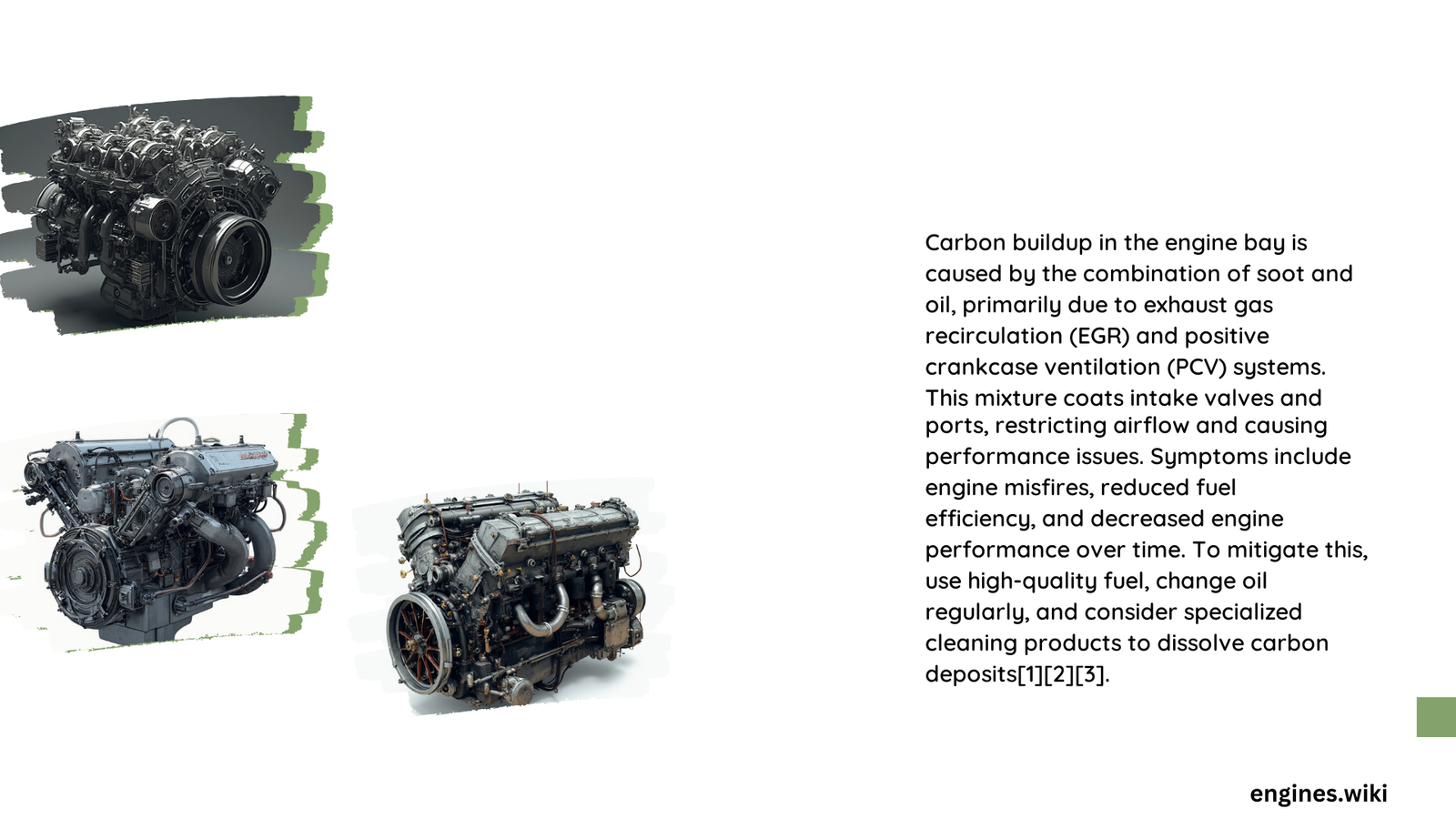Carbon build up in engine bay is a common issue that affects vehicle performance, fuel efficiency, and emissions. It occurs when carbon deposits accumulate on various engine components, particularly in the intake system and combustion chambers. This buildup can lead to reduced engine power, increased fuel consumption, and higher emissions. Understanding the causes, effects, and solutions for carbon build up is crucial for maintaining optimal engine performance and longevity.
What Causes Carbon Build Up in Engine Bay?
Carbon build up in engine bay is primarily caused by several factors:
- Fuel Quality: Low-quality fuel contains impurities and additives that contribute to carbon deposits.
- Driving Habits: Short trips, frequent stop-and-go traffic, and excessive idling promote incomplete combustion.
- Engine Design: Modern direct injection engines are more susceptible to carbon buildup on intake valves.
- Lack of Maintenance: Neglecting regular oil changes and air filter replacements can increase carbon deposits.
- EGR System Failure: A malfunctioning Exhaust Gas Recirculation system can lead to increased carbon buildup.
How Does Fuel Quality Affect Carbon Build Up?
Fuel quality plays a significant role in carbon build up:
- High-sulfur content fuels contribute more to carbon deposits
- Low-quality additives can leave residues that form carbon buildup
- Premium fuels often contain detergents that help reduce carbon deposits
What Driving Habits Contribute to Carbon Build Up?
Certain driving habits can exacerbate carbon build up:
- Frequent short trips prevent the engine from reaching optimal operating temperature
- Stop-and-go traffic in congested cities leads to incomplete combustion
- Excessive idling allows carbon deposits to accumulate more quickly
Why Are Modern Engines More Prone to Carbon Build Up?
Modern engine designs, particularly those with direct injection technology, are more susceptible to carbon build up:
- Fuel is injected directly into the combustion chamber
- Intake valves are not cleaned by fuel spray as in port-injection engines
- Higher combustion temperatures can bake carbon deposits onto surfaces
What Are the Effects of Carbon Build Up in Engine Bay?

Carbon build up in engine bay can have several negative effects on vehicle performance:
- Reduced Fuel Efficiency: Up to 20% decrease in fuel economy
- Loss of Horsepower: Up to 10% reduction in engine power output
- Increased Emissions: Up to 15% increase in NOx and other pollutants
- Engine Misfires: Irregular combustion due to carbon deposits
- Rough Idling: Uneven engine performance at low RPMs
How Much Does Carbon Build Up Affect Fuel Efficiency?
Carbon build up can significantly impact fuel efficiency:
| Carbon Build Up Level | Fuel Efficiency Reduction |
|---|---|
| Minimal | 5-10% |
| Moderate | 10-15% |
| Severe | 15-20% |
What Is the Impact on Engine Performance?
Engine performance suffers as carbon build up increases:
- Reduced throttle response
- Decreased acceleration
- Potential engine knocking or pinging
- Increased likelihood of engine overheating
How Can Carbon Build Up in Engine Bay Be Removed?
Several methods can be employed to remove carbon build up:
- Chemical Cleaners: Specialized solvents dissolve carbon deposits
- Engine Decarbonisation Services: Professional cleaning using HHO technology
- Mechanical Cleaning: Physical removal of deposits using brushes and scrapers
- Walnut Blasting: Abrasive cleaning method using crushed walnut shells
What Are the Steps for DIY Carbon Removal?
For those who prefer a hands-on approach, here’s a step-by-step guide:
- Ensure the engine is cool and disconnect the battery
- Remove the intake manifold and throttle body
- Apply a carbon cleaning solution to affected areas
- Allow the solution to soak according to manufacturer instructions
- Scrub deposits with a brush or scraper
- Rinse and dry all components thoroughly
- Reassemble the engine components
How Much Does Professional Carbon Removal Cost?
Professional carbon removal services vary in cost:
- Basic chemical cleaning: $100-$200
- HHO decarbonisation: $150-$300
- Walnut blasting: $300-$600
Costs may vary depending on the vehicle make and model, as well as the severity of carbon build up.
How Can Carbon Build Up in Engine Bay Be Prevented?
Preventing carbon build up is often easier and more cost-effective than removal. Here are some preventive measures:
- Use high-quality fuel with detergent additives
- Perform regular oil changes and air filter replacements
- Avoid excessive idling and short trips when possible
- Use fuel system cleaners periodically
- Consider carbon cleaning services as part of routine maintenance
What Is the Recommended Maintenance Schedule?
To prevent excessive carbon build up, follow this maintenance schedule:
- Oil changes: Every 5,000-7,500 miles or as per manufacturer recommendations
- Air filter replacement: Every 15,000-30,000 miles
- Fuel system cleaning: Every 30,000 miles
- Carbon cleaning service: Every 60,000-100,000 miles, depending on driving conditions
Are There Any Long-Term Solutions for Carbon Build Up?
While carbon build up is an ongoing issue, some long-term solutions can help:
- Installing an oil catch can to reduce oil vapors entering the intake
- Upgrading to a higher-flow exhaust system
- Using engine oils specifically designed to reduce carbon deposits
- Regular use of fuel system cleaners
By understanding the causes of carbon build up in engine bay and implementing preventive measures, vehicle owners can maintain optimal engine performance and extend the life of their engines. Regular maintenance and timely cleaning can significantly reduce the negative impacts of carbon deposits on fuel efficiency, power output, and emissions.
